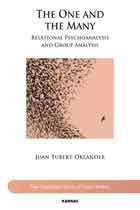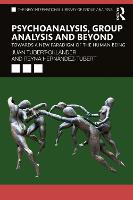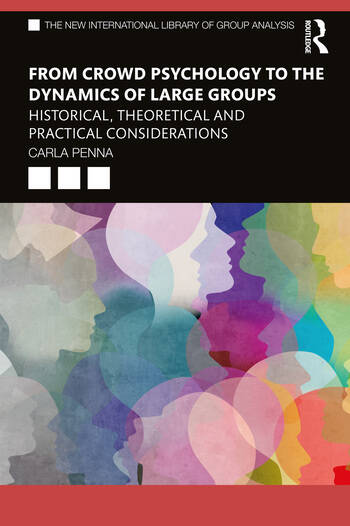The One and the Many: Relational Psychoanalysis and Group Analysis
Part of The New International Library of Group Analysis series - more in this series

Book Details
- Publisher : Routledge
- Published : January 2014
- Cover : Paperback
- Pages : 320
- Category :
Group Psychotherapy - Category 2 :
Psychoanalysis - Catalogue No : 33535
- ISBN 13 : 9781780491660
- ISBN 10 : 1780491662
Also by Juan Tubert-Oklander
There are currently no reviews
Be the first to review
This book is a of papers written between 2002 and 2012 on the subject of group analysis and relational psychoanalysis. From the author’s point of view, these two disciplines are really the two sides of the same coin, since both explore and use therapeutically what happens in the interphase between individual and collective ways of existence. It is divided into three parts. The first deals with the construction of a theory that articulates individual, relational, and collective mental processes; the second, with the problems of interpretation from the hermeneutic, psychoanalytic, and group-analytic points of view; the third, with the clinic and applications of relational analysis and group analysis.
One major theme is the construction of a new metapsychology that may allow us to transcend the limitations of the individual paradigm that underlies Freudian theory and the mainstream versions of psychoanalysis. In this, there is an attempt to integrate the contributions of Sándor Ferenczi, the British Independents, S. H. Foulkes’s group analysis, Enrique Pichon-Rivière and the Latin-American tradition that stems from his though and practice, and present-day developments in relational psychoanalysis. This amounts to a “mestization” of a number of branches of psychoanalysis and group analysis that stem from the original Freudian roots.
Reviews and Endorsements
‘A clinically and theoretically sophisticated book that extends psychoanalysis across the individual, dyadic, social, cultural, and political realms. It draws on an international array of thinkers and practitioners and it will be used to advance the integration of the psychotherapies.’
— Lewis Aron, PhD, Director of the New York University Postdoctoral Program in Psychotherapy and Psychoanalysis
‘A psychoanalyst and group analyst reflects about the number of objects considered in the various psychoanalytic theories and the meanings this number has in the clinical, social, political, ideological, and philosophical perspectives. Far from representing a departure from psychoanalysis, [his] personal observations are “a must”, if we are to continue developing the exploration of the unknown continent opened by Freud. This book delineates a new metapsychology able to integrate intrapersonal and interpersonal mental processes, group, and individual psychology.’
— Franco Borgogno, PhD, Full Professor of Clinical Psychology, University of Turin, and Training and Supervising Analyst, Italian Psychoanalytical Society
‘An inspiring glimpse into Latin American psychoanalysis and in particular its unique attention to group analysis, [revealing] the fecundity of the transpersonal and collective vertices in the psychoanalytic way of thinking and working. The loss of “purity” in contemporary psychoanalysis is well compensated by the creative potentials of cultural “mestization”. To read this book is to re-discover one’s analytic identity as an interconnected figure within a sort of hologram of the psychoanalytic world.’
— Charles Levin, PhD, Director, Canadian Institute of Psychoanalysis and Editor, Canadian Journal of Psychoanalysis
‘Juan Tubert-Oklander has a deep understanding about the emergence of Relational Psychoanalysis from the matrices of classical and modern psychoanalysis, the Foulkesian Group Analysis from Britain and Pichon-Rivière as the forerunner of both psychoanalysis and group analysis in Argentina. The clinical vignettes are illuminating, the chapter on Winnicott as Hermes in London inspiring.’
— Malcolm Pines, MD, Past President, International Association of Group Psychotherapy and Group-Analytic Society; former Consultant, Tavistock Clinic, London
‘Juan Tubert-Oklander achieves an almost impossible task: bridging the gap between psychoanalysis (especially relational approaches) and group analysis. He clarifies how what happens within people (intrapsychic, intrapersonal) cannot be explored without discussing what happens between people (interpsychic, interpersonal, and transpersonal). Juan is a Renaissance man, a polymath. This book is highly recommended for anyone interested in psychotherapy, whether individually or in groups.’
— Haim Weinberg, PhD, Past President of the Northern California Group Psychotherapy Society and of the Israeli Association of Group Psychotherapy; Director of International Programs at the Professional School of Psychology, California, USA
About the Author(s)
Juan Tubert-Oklander, MD, PhD, is an Argentine-born Mexican psychoanalyst and group analyst. He is a member of the Mexican Psychoanalytic Association, the Argentine Psychoanalytic Association, the Group-Analytic Society International, and Training and Supervising Analyst in the Institute of the Mexican Psychoanalytic Association. He is author and contributor of numerous books, articles and book chapters.
Customer Reviews
Our customers have not yet reviewed this title. Be the first add your own review for this title.
You may also like
Translation/Transformation: 100 Years of the International Journal of...
Dana Birksted-Breen
Price £26.99
save £3.00
From Crowd Psychology to the Dynamics of Large Groups: Historical, Theoretical...
Carla Penna
Price £31.99









